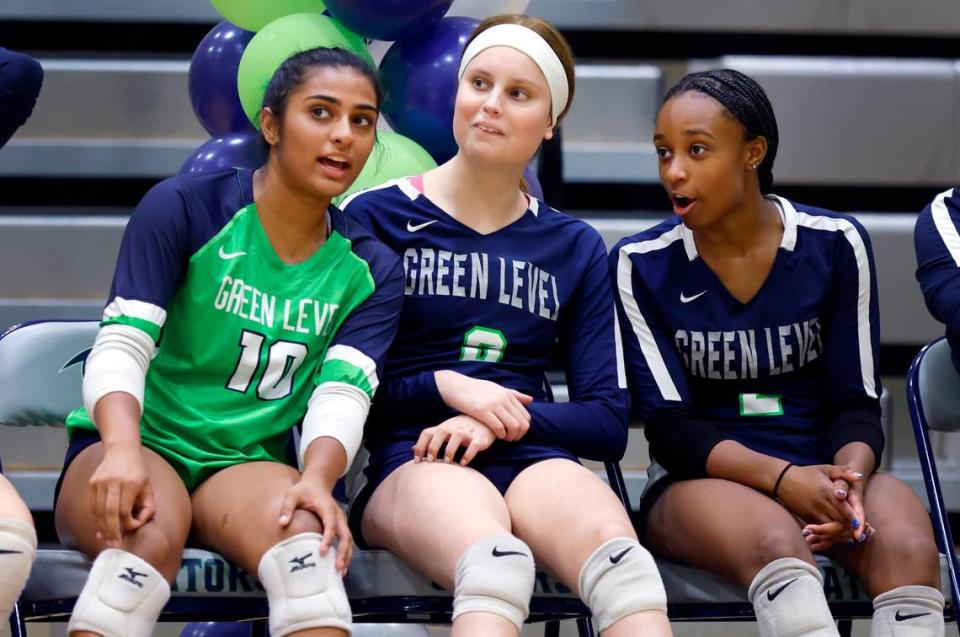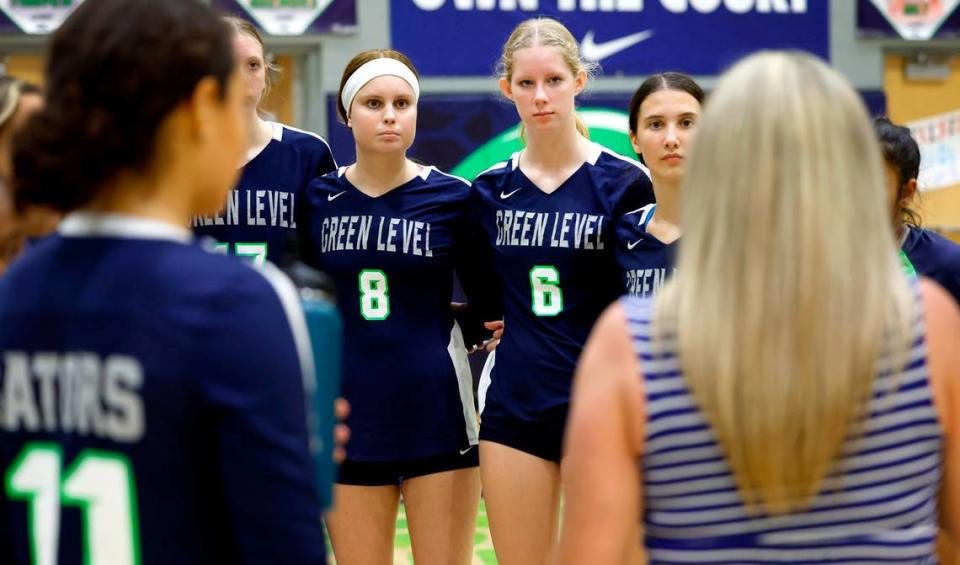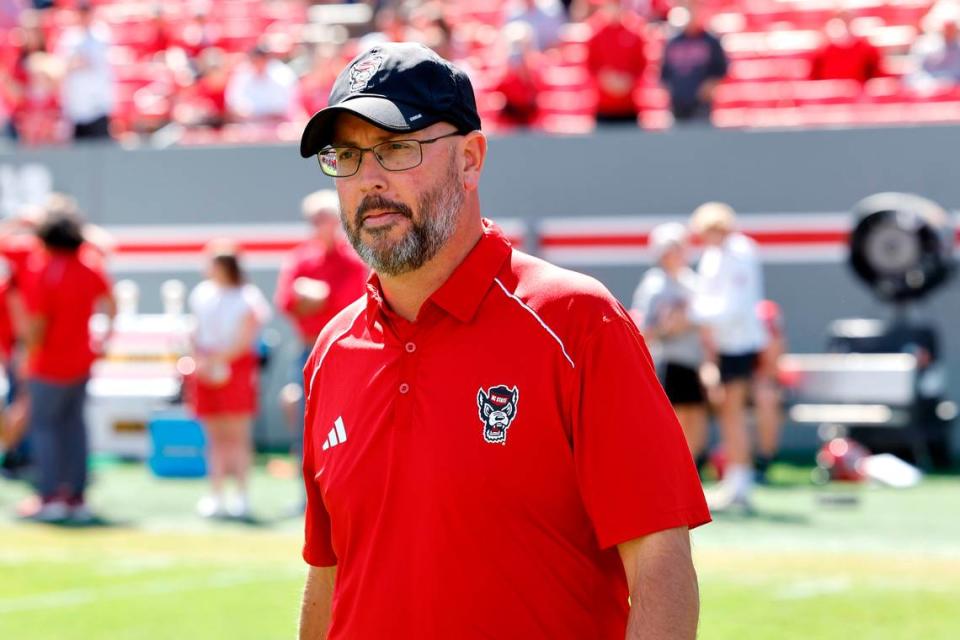Diagnosed with leukemia, Cary teen fundraising for research, supporting other patients
- Oops!Something went wrong.Please try again later.
- Oops!Something went wrong.Please try again later.
Reese Roper stepped to the service line as a substitute during Green Level High School’s volleyball match two weeks ago as fans for both teams gave her a standing ovation. It was the first time she’d played since receiving a diagnosis this year of acute lymphoblastic leukemia.
All she could think about was getting the ball over the net. It’s not the best mindset to have, she said with a laugh, but she couldn’t help it.
Everyone’s eyes were on her, and that made her uncomfortable.
The daughter of N.C. State quarterbacks coach Kurt Roper and his wife, Britt Roper, Reese doesn’t like being in the spotlight. She especially didn’t like the attention when it related to her health. But the 15-year-old has come around by using her challenging situation to help others.
She mentioned Maddie Wilson, an Apex Friendship High alumna. Wilson was diagnosed with lymphoma in high school but now plays at Wofford. Reese said Wilson’s experience helped her get through the hard times.
Now, if Reese can help other kids find positivity and hope through their diagnosis and treatment, she will accept the attention.
“At first, I was a little upset. Everyone knows all these stories because I’m sick,” Reese said last week. “I’ve come to realize that other people are sick, and they need someone to look up to. It’s empowering to be an example.”

‘Not something you would expect to happen’
When Kurt Roper told Reese of her diagnosis, she thought he was joking. Most families don’t expect to receive a childhood cancer diagnosis, and that’s the kind of relationship they have. He likes to have fun and push buttons.
There was no punchline this time.
The National Cancer Institute reports roughly 5,280 adolescents, 15 to 19 years old, will be diagnosed in 2023 with the disease, or about 1/3 of all expected childhood cancer cases. It also states approximately 1 in 285 children experience cancer before their 20th birthday.
Reese began exhibiting symptoms in November 2022, mostly abnormal fatigue during volleyball practice, pallor and a loss of appetite. It was weird, she said, because she never ran a fever or truly felt sick.
Britt Roper took her to her primary care physician multiple times, and she found nothing amiss. Reese just had a virus, the doctor kept saying. Rest and hydrate. Things will improve.
She didn’t get better, though. Alston Godbold — her high school and club coach — witnessed Reese’s decline. The now-sophomore went from dominating drills during the high school season to struggling just to complete the same ones later in the fall.
Reese came home in tears last year, days before Christmas. She was exhausted and experiencing momentary vision loss. They headed back to the doctor’s office.
Britt Roper called an oncologist friend during the drive over, whose expertise put them at ease.
“She was like, ‘Listen, I know it’s probably coming up when you’re Googling but there are 30 other things I would think that it is before leukemia or lymphoma or any of the cancers,’” Britt Roper said. “I’m like, ‘OK, that makes me feel better.’”
When they arrived at the office, Britt Roper refused to return home with the same instructions. She just knew it was more than a virus. The office ultimately sent the duo to the emergency room for additional tests.
The lingering symptoms
They stayed until midnight, getting a blood smear, X-Rays and a mono test, which came back positive.
The Ropers were relieved to hear it was mono and the staff found no lymphoblasts in her blood. They went to McDonald’s to celebrate for ice cream and other treats. Reese couldn’t play volleyball due to liver inflammation, but they knew it could’ve been worse.
As it turned out, it was.
Doctors allowed Reese to attend N.C. State’s late-December bowl game in Charlotte. She wasn’t allowed to share food or drinks and had to take it easy. Still, she made no improvement, and the doctors called requesting additional testing. They saw abnormalities in her white blood cells.
Reese received the news of her diagnosis on Jan. 2.
“Having that conversation was really hard and still hard to think about,” Kurt Roper said. “It’s made other conversations in my life a lot easier.”
Britt Roper understands why Reese’s pediatrician didn’t automatically jump to cancer, but she’s also glad the family advocated for multiple tests and took the symptoms seriously.
Acute lymphoblastic leukemia can be fatal within “a few months” of its development if left untreated, the American Cancer Society reports. With proper treatment protocols, though, the five-year survival rate for children is 90%.
“If it hadn’t been for volleyball, it scares me to think how long we would have gone before I pressed,” Britt Roper said. “We probably would have kept kicking down the line until it got bad, but volleyball let us know, ‘Hey, something is up.’”

‘What have I done to her?’
Reese walked into the hospital for her first surgery feeling OK. Her most recent volleyball practice left her winded, seeing white dots in her eyes — like walking out under the lights in a football stadium — and with a sickly complexion. But she didn’t feel sick.
The diagnosis was so shocking it almost didn’t feel real until the initial surgery. Doctors performed a bone marrow biopsy, port installation and injected chemotherapy medication into her spinal fluid. That’s when things took a turn.
“She woke up sick as a dog,” Britt Roper recalled, noting Reese’s nausea and vomiting. “I felt like, ‘What have I done to her?’”
Reese lost 40 pounds and developed diabetes while taking the first round of steroids, as well. She landed in the Pediatric Intensive Care Unit with an insulin drip and blood sugar reading of 818. It should’ve been between 90 and 130.
The first month was hardest for Britt Roper, as the family processed the diagnosis and Reese started treatment. She officially went into remission after the first 30 days, though protocol requires additional treatment to kill any remaining cells that do not show up on tests.
For Reese, the second phase, called consolidation, was the most difficult. She was stuck at home, lonely and disappointed about missing school activities.
It was like Covid quarantine, she said, but worse. Everyone else’s lives went on, while she was stuck at home. Reese didn’t even mind going to the hospital, because it meant she was around others.
“She’s been so strong, so tough, because it’s been really hard. It’s a long, long process,” Britt Roper said. “When they first gave me the phone call, they told me six months, and I was like, ‘Oh my gosh, six months.’ Then we got admitted and they said six to nine. Here we are still, 10 months…I didn’t realize it was basically two and a half years.”
A welcome return to Green Level
Now a sophomore, Reese is back at school, on the volleyball team, and remains in remission.
Reese begins the final phase of treatment, known as maintenance, soon. This phase is set to last until April 2025 and provides lower dose medication, while allowing her to resume normal activities.
She hopes to regain athletic stamina and earn a college scholarship. Coaches can begin contacting her next summer, but some friends have committed late into their senior year. There’s still plenty of time.
“She’s handled it with such grace and strength,” Britt Roper said. “I’m sure she’s sad about what she missed out on, but she’s a pretty determined individual with everything that she’s ever done. I think she’ll be fine and that will serve her well.”
‘It’s not just about her’
Green Level High School recently hosted an “Orange” game at the recommendation of coach Alston Godbold, in honor of the Leukemia and Lymphoma Society.
Reese gave a speech, and her teammates teared up. Fans donated directly to the Leukemia and Lymphoma Society instead of paying traditional game admission. The team hosted raffles and a silent auction, featuring donations from North Carolina, Duke and N.C. State. The team has raised $12,205 for the organization, which helps fund research and financially supports families in need.
And, after losing the first two sets, Reese’s team swept the next three to pull out a thrilling win.
“I was like, ‘Oh my gosh, we’re losing this game?’” Reese said. “I had prepared myself for us to lose that third set. That would have been a little embarrassing, but they ended up pulling it out and they played super great the next three sets.
“I was proud of them for that, because they were representing people who have these cancers,” she continued. “That just made me happy, and I felt supported by all my teammates, friends, family and coach.”
The Leukemia and Lymphoma Society hosts a nationwide “Light the Night” fundraiser every October, with the Triangle’s event set for 5:30 p.m. Saturday at Koka Booth Amphitheater in Cary. With a goal to raise $1.9 million, the organization has currently raised $1.1 million.
Reese’s team, which is still accepting donations, is currently No. 3 among the top community and school teams. Green Level didn’t set a specific goal, Britt Roper said, because no one really knew what to expect. They hope to see the number climb.
“She really genuinely cares about other people. The first thing that we all want to come out of this is for her to be healthy and live a long happy life, but there’s so much more that can come from that,” Kurt Roper said. “I think she really enjoys trying to make those things happen.
“It’s not just about her, and she’s got a platform to try and help. I think it’s great. She’s trying to use that as much as she can within her school and community.”
"It puts things in perspective really, really quickly." @PackFootball Coach Kurt Roper and his family have dealt with a health scare. They have found strength in Reese's resolve and the love and support shown by many.#GoPack #PlayForReese pic.twitter.com/q8eh8sBqF3
— Jeff Gravley (@JGravleySPORTS) October 3, 2023
What’s most important
Small blue baskets sit on a wooden dining table in the Roper home. They’re filled with candy, stuffed alligators — because Green Level’s mascot is the Gators — and other treats. Photo books for Reese’s senior teammates sit next to them. They include photos from their visits during her more intense recovery phases.
Cancer puts everything into perspective quickly, Kurt Roper said. Even though Reese’s prognosis was positive from the beginning, there are never guarantees, and the family is constantly reminded to take joy in the little things while understanding the truly important things in life.
Reese went to Green Level’s homecoming and took pictures with her friends. She was well enough to make gift baskets for her teammates. The McDonald’s ice cream machine worked on the night after her ER visit. The Ropers hope to travel again and spend more time together. All of those things mean she’s alive and progressing.
This experience has provided a new appreciation for Kurt Roper’s busy coaching schedule, too. He’s not always home, so Britt Roper handles the bulk of care for Reese and their son, Luke. That’s tough for both parents for different reasons.

Kurt Roper said he’s grateful to work at N.C. State, though. It provides him with a job, health insurance, financial stability and time off — something many families don’t have.
“Coach (Dave) Doeren has been great. Rob, Coach Anae, has been great. What I need, N.C. State and (athletic director Boo Corrigan) have provided,” Kurt Roper said. “I can’t imagine having to do this without this football staff and N.C. State.”
Reese Roper was born on Feb. 8, 2008, in Knoxville, Tennessee. Kurt and Britt Roper’s lives changed the moment she entered the world. Their hopes and priorities changed.
Fifteen years later, she’s still inspiring change, but on a much larger scale. She’s doing it for other kids with cancer, and anyone who just needs a little hope.
“She’s handled it with such grace and strength,” Britt Roper said. “I’m sure she’s sad about what she missed out on, but she’s a pretty determined individual with everything that she’s ever done. I think she’ll be fine, and that will serve her well.”

